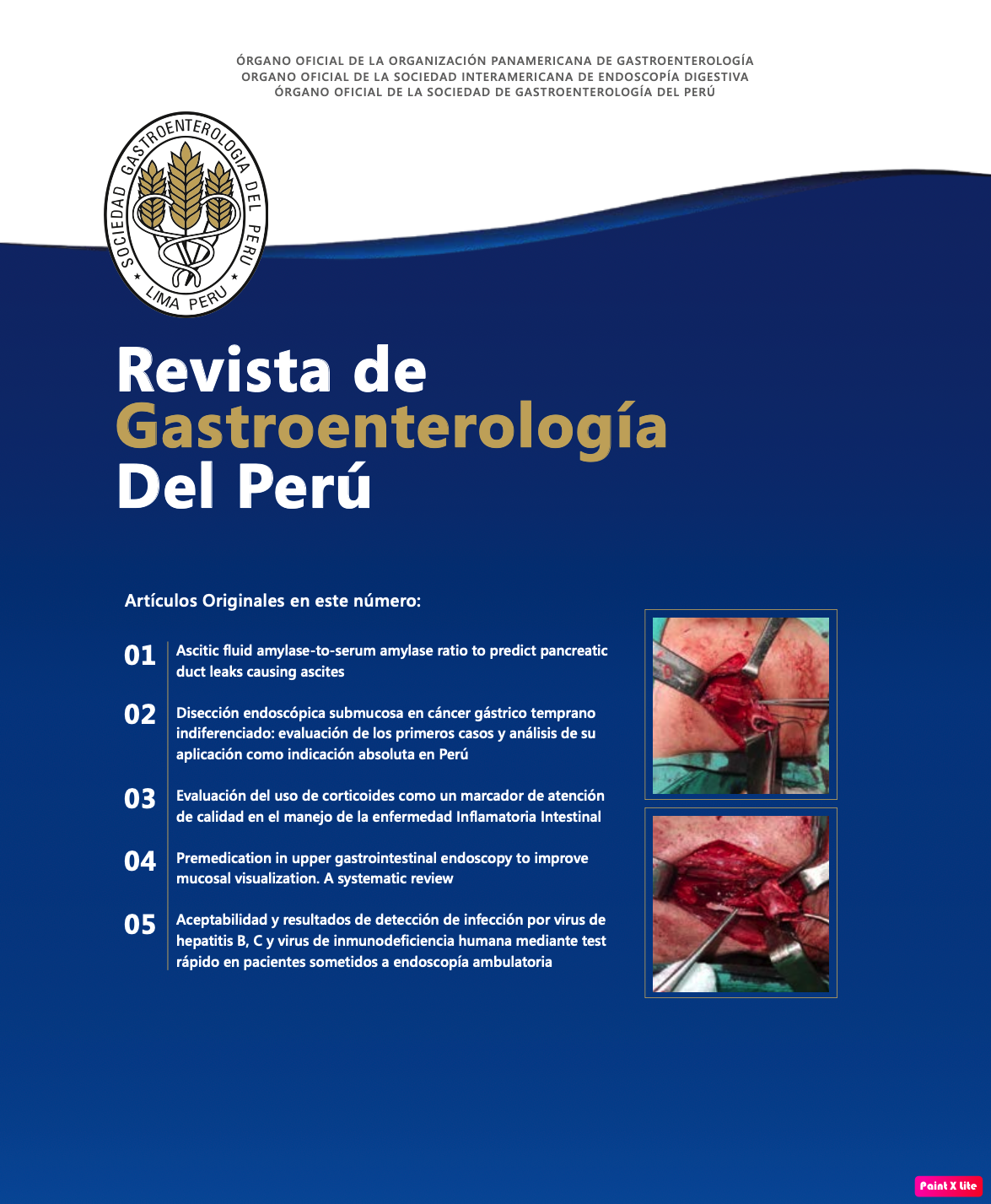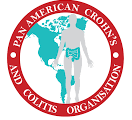Assessment of corticosteroid use as a marker of quality-of-care in the management of inflammatory bowel disease
DOI:
https://doi.org/10.47892/rgp.2024.444.1772Keywords:
inflammatory bowel diseases, Corticosteroids, Steroids, Quality of Health Care, Quality of LifeAbstract
Introduction: Despite advancements in therapeutic strategies, corticosteroids continue to play a role in inducing remission in Inflammatory Bowel Disease (IBD). Unfortunately, these drugs are often misused. Objectives: To assess the dose and duration of corticosteroid therapy, and the subsequent change in treatment among patients with IBD. Materials and methods: We conducted a descriptive, retrospective observational study on patients with IBD under follow-up at the IBD Program of Clínica Universidad de los Andes from January 2021 to August 2022. Results: Four hundred and thirty-two IBD were included, with 63% being women, with a median age of 42 years (14-94), 66% had ulcerative colitis (UC). Sixty-six percentage of patients had received corticosteroids during the course of their disease (range 1-9 times) for a median duration of 12 weeks (2-48 weeks), with prednisone being the most frequently used corticosteroids (53%). Seventy-seven percentage of patients had received treatment for over 3 months or in supratherapeutic doses (prednisone > 60 mg day). There was a change in the treatment after the use of corticosteroid in 28% of patients compared to 90% after entering the program (p<0.001, CI95%: 1.83-2.49). During the Program’s follow-up, 10% received corticosteroids (71% prednisone, 29% budesonide) with no variations based on IBD type, gender, age, or treatment. No patient received corticosteroids for over 3 months or in supratherapeutic doses in our IBD Program. Conclusion: This study emphasizes the importance of evaluating corticosteroids use as a quality-of -care marker in IBD. The management of these patients through a specialized program could mitigate the excessive use of these drugs.
Downloads
Metrics
References
Torres J, Bonovas S, Doherty G, Kucharzik T, Gisbert JP, Raine T, et al. ECCO guidelines on therapeutics in Crohn’s disease: medical treatment. J Crohns Colitis. 2020;14(1):4-22. doi: 10.1093/ecco-jcc/jjz180.
Raine T, Bonovas S, Burisch J, Kucharzik T, Adamina M, Annese V, et al. ECCO guidelines on therapeutics in ulcerative colitis: medical treatment. J Crohns Colitis. 2021;16(1):2-17. doi: 10.1093/ecco-jcc/jjab178.
Baumgart DC, Le Berre C. Newer biologic and small-molecule therapies for Inflammatory Bowel Disease. N Engl J Med. 2021;385(14):1302-1315. doi: 10.1056/NEJMra1907607
Quera R, Núñez P, Sicilia B, Flores L, Gomollón F. Corticosteroids in Inflammatory Bowel Disease: Are they still a therapeutic option? Gastroenterol Hepatol. 2023;46(9):716-726. doi: 10.1016/j.gastrohep.2022.10.017.
Grennan D, Wang S. Steroids side effects. JAMA. 2019;322(3):282. doi: 10.1001/jama.2019.8506.
Rosiou K, Carbonell J, Dolby V, Monfared N, Raine T, Selinger CP. Sources of excess steroid prescriptions and clinical adverse outcomes associated with steroid excess in patients with Inflammatory Bowel Disease: The Leeds IBD steroid study. Aliment Pharmacol Ther. 2022;56(3):501-509. doi: 10.1111/apt.17039.
Plevris N, Lees CW. Disease monitoring in Inflammatory Bowel Disease: Evolving principles and possibilities. Gastroenterology. 2022;162(5):1456-1475. doi: 10.1053/j.gastro.2022.01.024.
Sicilia B, García-López S, González-Lama Y, Zabana Y, Hinojosa J, Gomollón F. Grupo Español de Trabajo de Enfermedad de Crohn; Colitis Ulcerosa o Spanish Group for Working on Crohn´s Disease and Ulcerative Colitis (GETECCU). GETECCU 2020 guidelines for treatment of ulcerative colitis. Developed using GRADE approach. Gastroenterol Hepatol. 2020;43 Suppl 1:1-57. doi: 10.1016/j.gastrohep.2020.07.001.
Gomollón F, Dignass A, Annese V, Tilg H, Van Assche G, Lindsay JO, et al. 3rd European evidence-based consensus on the diagnosis and management of Crohn´s disease 2016: Part 1: Diagnosis and medical management. J Crohns Colitis. 2017;11(1):3-25. doi: 10.1093/ecco-jcc/jjw168.
Magro F, Gionchetti P, Eliakim R, Ardizzone S, Armuzzi A, Barreiro-de Acosta M, et al. Third European evidence-based consensus on the diagnosis and management of Ulcerative Colitis. Part 1: Definitions, diagnosis, extra-intestinal manifestations, pregnancy, cancer surveillance, surgery, and ileo-anal pouch disorders. J Crohns Colitis. 2017;11(6):649-670. doi: 10.1093/ecco-jcc/jjx008.
Quera R, Núñez P, Flores L, Bay C. Corticoides en el manejo de la Enfermedad Inflamatoria Intestinal: se propone un uso racional. Rev Med Chile. 2022;150(5):691-698. doi: 10.4067/s0034-98872022000500697.
Lamb CA, Kennedy NA, Raine T, Hendy PA, Smith PJ, Limdi JK, et al. British Society of Gastroenterology consensus guidelines on the management of inflammatory bowel disease in adults. Gut. 2019;68(Suppl 3):s1-s106. doi: 10.1136/gu-tjnl-2019-318484.
Núñez P, Mahadevan U, Quera R, Bay C, Ibáñez P. Treat to target approach in the management of Inflammatory Bowel Disease. Gastroenterol Hepatol. 2021;44(4):312-329. doi: 10.1016/j.gastrohep.2020.06.032. Epub 2020 Oct 16.
Turner D, Ricciuto A, Lewis A, D’Amico F, Dhaliwal J, Griffiths AM, et al. STRIDE-II: an update on the Selecting Therapeutic Targets in Inflammatory Bowel Disease (STRIDE) initiative of the International Organization for the Study of IBD (IOIBD): determining therapeutic goals for treat-to-target strategies in IBD. Gastroenterology. 2021;160(5):1570-1583. doi: 10.1053/j.gastro.2020.12.031.
Steinhart AH, Ewe K, Griffiths AM, Modigliani R, Thomsen OO. Corticosteroids for maintenance of remission in Crohn’s disease. Cochrane Database Syst Rev. 2003;(4):CD000301. doi: 10.1002/14651858.CD000301.
Selinger CP, Parkes GC, Bassi A, Fodgen E, Hayee B, Limdi Jk, et al. A multi-centre audit of excess steroid use in 1176 patients with inflammatory bowel disease. Aliment Pharmacol Ther. 2017;46(10):964-973. doi: 10.1111/apt.14334.
Selinger CP, Parkes GC, Bassi A, Limdi JK, Ludlow H, Patel P, et al. Assessment of steroid use as a key performance indicator in inflammatory bowel disease-analysis of data from 2385 UK patients. Aliment Pharmacol Ther. 2019;50(9):1009-1018.
Matsuoka K, Igarashi A, Sato N, Isono Y, Gouda M, Iwasaki K, et al. Trends in corticosteroid prescriptions for ulcerative colitis and factors associated with long-term corticosteroid use: analysis using Japanese claims data from 2006 to 2016. J Crohns Colitis. 2021;15(3):358-366. doi: 10.1093/ecco-jcc/jjaa172.
Fascì-Spurio F, Meucci G, Papi C, Saibeni S. The use of oral corticosteroids in inflammatory bowel diseases in Italy: an IGIBD survey. Dig Liver Dis. 2017;49(10):1092-1097. doi: 10.1016/j.dld.2017.07.005.
Rubin DT, Ananthakrishnan AN, Siegel CA, Sauer BG, Long MD. ACG clinical guideline: ulcerative colitis in adults. Am J Gastroenterol. 2019;114(3):384-413. doi: 10.14309/ajg.0000000000000152
Yang YX, Lichtenstein GR. Corticosteroids in Crohn’s disease. Am J Gastroenterol. 2002;97(4):803-823. doi: 10.1111/j.1572-0241.2002.05596.x.
Chhaya V, Saxena S, Cecil E, Subramanian V, Curcin V, Majeed A, et al. Steroid dependency and trends in prescribing for inflammatory bowel disease - a 20- year national population-based study. Aliment Pharmacol Ther. 2016;44(5):482-494. doi: 10.1111/apt.13700.
Waljee AK, Wiitala WL, Govani S, Stidham R, Saini S, Hou J, et al. Corticosteroid use and complications in a US inflammatory bowel disease cohort. PLoS One. 2016;11(6):e0158017 doi: 10.1371/journal.pone.0158017.
Jeuring SF, Biemans V, van den Heuvel T, Zeegers M, Hameeteman W, Romberg-Camps M, et al. Corticosteroid sparing in inflammatory bowel disease is more often achieved in the immunomodulator and biological era-results from the Dutch population-based IBDSL cohort. Am J Gastroenterol. 2018;113(3):384-395. doi: 10.1038/ajg.2017.482.
Ghosh S, Bressler B, Petkau J, Thakkar R, Wang S, Skup M, et al. Healthcare providers underestimate patients’ glucocorticoid use in Crohn’s disease. Dig Dis Sci. 2019;64(5):1142-1149. doi: 10.1007/s10620-018-5419-3.
Irving PM, Gearry RB, Sparrow MP, Gibson PR. Review article: appropriate use of corticosteroids in Crohn’s disease. Aliment Pharmacol Ther. 2007;26(3):313-29. doi: 10.1111/j.1365-2036.2007.03379.x.
Rubin DT, Patel H, Shi S, Mody R. Assessment of corticosteroid- related quality of care measures for ulcerative colitis and Crohn’s disease in the United States: a claims data analysis. Curr Med Res Opin. 2017;33:529-536 doi: 10.1080/03007995.2016.1267616
Downloads
Published
How to Cite
Issue
Section
License
Copyright (c) 2024 Rodrigo Quera, Paulina Núñez F., Lilian Flores

This work is licensed under a Creative Commons Attribution 4.0 International License.
Revista de Gastroenterología del Perú by Sociedad Peruana de Gastroenterología del Perú is licensed under a Licencia Creative Commons Atribución 4.0 Internacional..
Aquellos autores/as que tengan publicaciones con esta revista, aceptan los términos siguientes:
- Los autores/as conservarán sus derechos de autor y garantizarán a la revista el derecho de primera publicación de su obra, el cuál estará simultáneamente sujeto a la Licencia de reconocimiento de Creative Commons que permite a terceros compartir la obra siempre que se indique su autor y su primera publicación esta revista.
- Los autores/as podrán adoptar otros acuerdos de licencia no exclusiva de distribución de la versión de la obra publicada (p. ej.: depositarla en un archivo telemático institucional o publicarla en un volumen monográfico) siempre que se indique la publicación inicial en esta revista.
- Se permite y recomienda a los autores/as difundir su obra a través de Internet (p. ej.: en archivos telemáticos institucionales o en su página web) antes y durante el proceso de envío, lo cual puede producir intercambios interesantes y aumentar las citas de la obra publicada. (Véase El efecto del acceso abierto).




















 2022
2022 